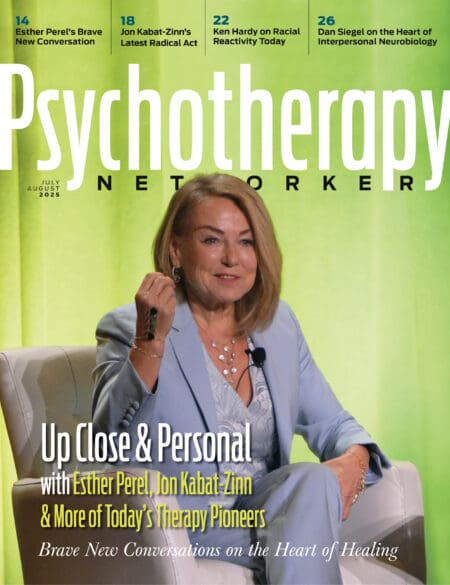Enjoy the audio preview version of this article—perfect for listening on the go.
For Americans in distress, wait times for desperately needed treatment programs or a first therapy appointment can range from weeks to months, even for people in the most disturbing of emotional states. For American seniors, these wait times often worsen existing physical problems and prolong emotional pain at a time of life when mental wellness can already be a struggle.
Richard, a retired mental health worker from Medford, Oregon, is no stranger to the healthcare field’s problem of often excruciating wait times for new clients. But when Sandy, his wife of 44 years, was diagnosed in quick succession with leukemia and bipolar disorder two years ago, the issue took on dire new meaning.
Though both diagnoses were worrisome, Sandy’s cancer diagnosis was particularly bleak. She was given 6 to 18 months to live, and when she opted for chemo, which she was told might help her hold on longer, the treatment jump-started bouts of mania and depression.
Sandy’s initial overwhelm at the prospect of dying quickly became a desperate fear that wouldn’t abate. Richard contacted psychologists and social workers under Medicare’s Advantage Plan to get her immediate help. But in and around Medford, a city of about 80,000 people, the help just wasn’t there. Over and over, he was told practitioners were not accepting new patients or that the earliest appointments were months away.
After a worsening Sandy was hospitalized for an acute manic episode, Richard thought maybe the serious nature of inpatient treatment would finally open up some ongoing mental health resources for her. But Sandy’s discharge plan was a single follow-up visit with the psychiatrist who’d diagnosed her. No case management. No individualized treatment plan with regular appointments. Neither, Richard was told, were available.
As Sandy’s physical and emotional health became more fragile, Richard kept looking on his own, but all the LCSWs and PhDs he approached said they were already full. Other counselors that did have room were not Medicare approved.
Eight months after her diagnosis, Sandy was at her oncologist’s office for a routine appointment when a nurse practitioner abruptly asked her if she was afraid to die. This was followed by the news that she had just days left to live. Terribly frightened and sobbing uncontrollably, Sandy was prescribed morphine and hospice care but no counseling of any kind. It was New Year’s Eve and the nurse who later arrived at Richard and Sandy’s home inserted a catheter, gave him instructions on dispensing morphine, and left for a party. Sandy died the next morning with just Richard by her side.
The unnecessary pain that his beloved Sandy endured has turned Richard into an activist. He’s joined with other seniors, including retired therapist Erika Bekermeier, from nearby Ashland, Oregon, to close the yawning gap in mental health care options for seniors.
Medicare currently reimburses psychiatrists, psychologists, clinical social workers, and psychiatric nurses for inpatient psychiatric care and for doing assessments, prescribing medication, and providing family, group, and individual therapy on an outpatient basis.
The two Oregonians are backing a plan that lobbies for Medicare to add mental health counselors (MHCs) and marriage and family therapists (MFTs) to its cadre of providers.
Their work is entwined with the Medicare Access Coalition, a group of counseling and MFT associations that’s behind a charge to pass a bipartisan bill called the Seniors Mental Health Access Improvement Act.
The bill makes special note of the many seniors who live in the 3,000 areas of the country that have severe shortages in the kind of mental health professionals that Medicare currently covers. For example, a full 50 percent of rural American counties don’t have a single practicing psychiatrist, psychologist, or social worker.
The Coalition believes that by adding MFTs and MHCs to Medicare’s provider ranks, the government will gain a windfall of 200,000 more trained mental health professionals. That means more options for rural and urban communities, and it means more professionals with the kind of training to treat addiction and hard-to-reach seniors that could make a dent in the opioid, depression, and suicide epidemics.
“Oregon has the highest rates of opioid hospital stays for seniors of any state in the country. These people are lonely and have no support,” Bekermeier says. Not only is she concerned about her fellow senior Oregonians, but Bekermeier has concerns that the bill—which is similar to other bills that have made it either through Congress or the Senate, but never both—could “drop to the bottom.”
Though the CDC says a fifth of Americans over 55 have a mental health issue, and older men have the highest suicide rate of any age group, Bekermeier believes that seniors’ issues just “don’t have much political cache. And you know, the older I get the more I get the sense from others that seniors just aren’t that important.”
The Medicare Access Coalition is quick to point out that MHCs and MFTs do not represent a lower standard of care for seniors than the practitioners Medicare currently reimburses. Each, they say, obtains a master’s or doctoral degree in counseling, has two years of postgraduate supervised experience, and passes a national exam to obtain a license to practice independently. Both groups, they also emphasize, are licensed in every state to both diagnose and treat mental health issues. They already work in the Veterans Administration, for the National Health Service Corps, and are part of the military’s TRICARE network.
The Seniors Mental Health Access Improvement Act will go before Congress in January with backing from the AARP and NAMI. Bekermeier hopes mental health providers of all stripes will voice their support for it with their own representatives in the ensuing weeks.
“Other therapists can write or call their legislators to help get this bill passed,” she says. “Not only will it create more work for fellow therapists, but it’s also a way to support those many seniors who are so desperate for our help.”
Photo © iStock/delihayat
Lauren Dockett
Lauren Dockett, MS, is the senior writer at Psychotherapy Networker. A longtime journalist, journalism lecturer, and book and magazine editor, she’s also a former caseworker taken with the complexity of mental health, who finds the ongoing evolution of the therapy field and its broadening reach an engrossing story. Prior to the Networker, she contributed to many outlets, including The Washington Post, NPR, and Salon. Her books include Facing 30, Sex Talk, and The Deepest Blue. Visit her website at laurendockett.com.












